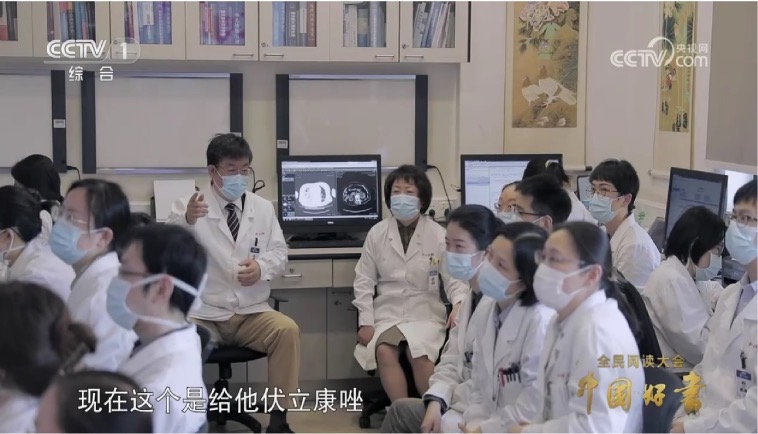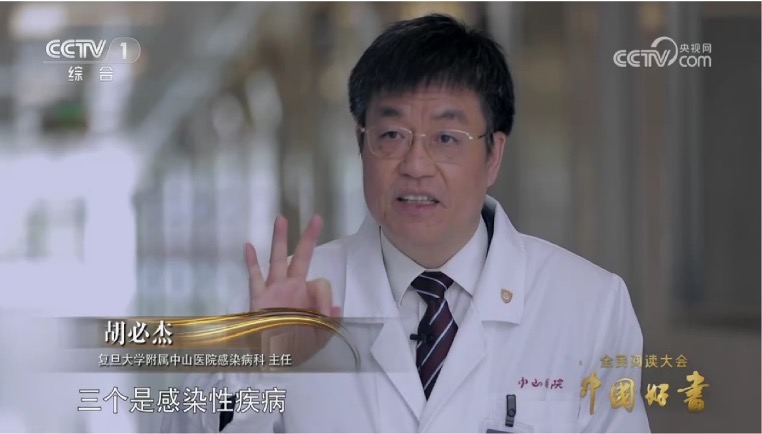Department Overview
Zhongshan Hospital affiliated with Fudan University was established in 2014 to adapt to changes in infectious disease spectrum. The department specializes in diagnosis and treatment of complicated bacterial, fungal and drug-resistant infections, and fever of unknown origin. It has pioneered a comprehensive model for infectious disease management in China that integrates diagnosis, treatment, and prevention, allowing Chinese patients to receive care that meets international standards.
The Department of Infectious Diseases and the Hospital Infection Control Department of Zhongshan Hospital serves as a training base for the National Health Commission’s "Bacterial and Fungal Infection Diagnosis and Treatment Training Program (Peiyuan Plan)." They are also the National Hospital Infection Management Quality Control Center and the European Society of Clinical Microbiology and Infectious Diseases (ESCMID) Collaborative Centre in China. Currently, the Department of Infectious Diseases has two wards with a total of 51 beds. To manage various public health emergencies and severe pneumonia cases, 14 independent negative pressure rooms are available, equipped with advanced medical devices such as visualized intensive care monitoring systems, portable ultrasound systems, high-flow humidified oxygen therapy devices, non-invasive ventilators, invasive ventilators, and high-definition electronic bronchoscopy systems. The department also runs specialized outpatient clinics for infectious diseases, specialized and general outpatient services, a multidisciplinary clinic for "fever of unknown origin," and is responsible for the management of fever clinics, clinical diagnosis and treatment of infectious diseases hospital-wide, and antimicrobial stewardship.
Under the leadership of Professor Hu Bijie, the department currently has 24 clinical physicians, including 23 with a Ph.D. and 1 with a master's degree. Among them, there are 4 senior and 19 intermediate-level professionals. The Infectious Diseases Department collaborates closely with hospital infection management professionals, clinical microbiologists, and clinical pharmacists specializing in antimicrobial therapy, forming a robust "Zhongshan Hospital Infection Control Team." The team was awarded the "Shanghai Quality Gold Award" in 2020 and the "Shanghai Worker Pioneer" in 2023.


Specialties of the Department
The Infectious Diseases Department of Zhongshan Hospital focuses on developing a "subspecialty model," forming the following four major specialty areas. In addition, the department established the first localized metagenomic next-generation sequencing (mNGS) platform in China, with leading technology of pathogen detection in nationwide. The bacteriophage research team has made initial progress in the clinical treatment of multi-drug resistant bacteria using bacteriophages. Currently, the department provides clinical diagnosis and treatment services to patients nationally.
1. Mycobacterial Infections (Nontuberculous Mycobacterial Infections and Extrapulmonary Tuberculosis): Establishment of clinical diagnosis and treatment guidelines, and development of a laboratory platform focused on mycobacterial research.
2. Deep Fungal Infections: Rapid diagnosis, precise treatment, and host immunity research.
3. Drug-Resistant Infections: Research on resistance genes and mechanisms, application of bacteriophage therapy, and control and prevention of drug-resistant bacteria.
4. Acute Respiratory Viral Infections: Rapid diagnosis, epidemiological monitoring and research, and prevention and control.
Scientific and Educational Achievements
As a training platform for infectious disease specialists with expertise in bacterial and fungal infection diagnosis and treatment, the Infectious Diseases Department of Zhongshan Hospital currently has one Ph.D. supervisor and two master's supervisor, who have trained over 20 Ph.D. and master's students. The infection control team regularly hosts national continuing medical education programs and undertakes various teaching responsibilities, including training infection control physicians and internal medicine residents in Shanghai, as well as Fudan University undergraduate and graduate students, and refresher physicians. Additionally, the department has established curriculum on ‘New Advances in Hospital Infection Prevention and Control and Case Analysis of Difficult Infectious Diseases Diagnosis and Treatment’ for postgraduate.
Since July 2017, the infection control team has published over 300 articles through the WeChat public account "Zhongshan Infection Case Series", sharing challenging and fascinating real cases and original knowledge on infection prevention and control, which have significantly increased the department's influence in the community. The team has authored several medical books, including "Zhongshan Infection Case Series—Clinical Thinking of Difficult Cases," "Training in Diagnosis and Treatment of Bacterial and Fungal Infections," and "Medical Cases Investigation—Stories from the Department of Infectious Diseases." They have also translated authoritative books such as "Harrison's Infectious Diseases," "Bennett and Brachman's Hospital Infections," and "Bailey and Scott's Diagnostic Microbiology," which have gained attention and praise from the public and peers alike.
The Zhongshan Hospital infection control team continually innovates and advances, having secured more than 10 national, ministerial and provincial level research subjects. They have achieved significant results in the development of new patents, publications in core Chinese and SCI-indexed journals, and presentations at national and international academic conferences. The "Shanghai Hospital Infection Big Data Platform Construction and Application" project won the Shanghai Medical Science and Technology Award in 2020. The Shanghai International Forum on Infection Control (SIFIC), hosted for 20 consecutive years, is the most influential national academic conference in the field. The team has led the development of several key documents, including consensus statements on the rational clinical use of antimicrobial drugs, COVID-19 prevention and control, and clinical application of next-generation sequencing, all of which have played a crucial role in guiding clinical practice.

Main Areas of Diagnosis and Treatment:
1. Fever of unknown origin
2. Respiratory tract infections: variety of pneumonia, lung abscesses, pulmonary fungal infections, pulmonary granulomatous diseases, infectious pleural effusion, bronchiectasis infection, acute exacerbations of chronic obstructive pulmonary disease (COPD), bronchitis, tonsillitis, etc.
3. Cardiovascular infections: bloodstream infections (including sepsis), endocarditis
4. Gastrointestinal infections: gastrointestinal infections, infectious diarrhea, biliary tract infections, peritonitis, liver abscess, etc.
5. Genitourinary system infections: urethritis, cystitis, pyelonephritis, renal abscess, pelvic inflammatory disease, etc.
6. Central nervous system infections: meningitis, brain abscess, etc.
7. Skin and soft tissue infections, bone and joint infections, surgical wound infections, other traumatic infections
8. Deep-sited fungal infections, drug-resistant bacterial infections, nontuberculous mycobacterial infections, tuberculosis (sputum smear-negative), parasitic infections
9. Infections in organ transplant recipients, infections in immunocompromised or neutropenic hosts
10. Infections associated with various indwelling catheters (vascular catheters, urinary catheters, endotracheal tubes, etc.), infections related to implanted medical devices, and other hospital-acquired infections.
Specialist Outpatient Clinic (East Campus, Building 15, 2nd Floor: 1609 Xietu Road)
- Hu Bijie, Chief Physician: Monday afternoons, Wednesday mornings, Thursday mornings
- Pan Jue, Chief Physician: Tuesday afternoons, Thursday afternoons, Friday mornings
Senior Specialist Outpatient Clinic (West Campus, Building 20, 9th Floor: 111 Yixueyuan Road)
- Hu Lijuan, Associate Chief Physician: Saturday mornings
- Miao Qing, Associate Chief Physician: Saturday afternoons
General Specialist Outpatient Clinic (West Campus, Building 20, 8th Floor: 111 Yixueyuan Road)
- Hu Lijuan, Associate Chief Physician: Monday mornings, Wednesday afternoons
- Miao Qing, Associate Chief Physician: Tuesday afternoons, Thursday afternoons
General Outpatient Clinic for Infectious Diseases and Internet Hospital: Monday to Saturday, all day (West Campus, Building 20, 2nd Floor, Rooms 124/125: 111 Yixueyuan Road)
Specialty Outpatient Clinics (West Campus, Building 20, 2nd Floor, Rooms 124/125: 111 Yixueyuan Road)
- Lymphadenopathy (Tuesday mornings, Thursday afternoons): Cervical lymphadenopathy is common, with a significant proportion caused by infectious diseases, including tuberculosis infection, EBV infection, Bartonella, and bacterial infections.
- Tuberculosis Consultation (Monday afternoons, Friday mornings): Identification and treatment of latent tuberculosis and extrapulmonary tuberculosis, such as patients with positive T-cell response to mycobacterium tuberculosis(T-Spot/QFT) or Xpert tests.
- Fever of Unknown Origin (Wednesday mornings, Saturday mornings): Patients with unexplained fever.
- Secondary Infections in Cancer Patients (Tuesday afternoons, Saturday afternoons): Identification and treatment of infections in patients with underlying cancer.
- Complex Infections (Organ Transplant) (Monday mornings, Friday afternoons): Diagnosis and treatment of infections in organ transplant recipients (e.g., heart, liver, kidney).
- Complex Infections (Urinary System) (Wednesday afternoons, Thursday mornings): Recurrent urinary tract infections, especially in patients with functional or structural abnormalities of the urinary tract or immunocompromised individuals.



